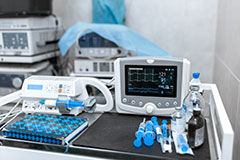 The medical diagnostic space encompasses reagents, instruments, imaging devices and services that aid in diagnosing diseases and evaluating courses of treatment with improved accuracy. Such apparatuses introduce a challenge to manufacturers in that they require precision and adherence to the strictest standards and regulations, while needing to withstand harsh, repeated autoclaving conditions and constant disinfection. As the industry has made headway, it has required design advantages provided by adhesives; thus epoxies and silicones have become vital to manufacturing these diagnostic medical devices.
The medical diagnostic space encompasses reagents, instruments, imaging devices and services that aid in diagnosing diseases and evaluating courses of treatment with improved accuracy. Such apparatuses introduce a challenge to manufacturers in that they require precision and adherence to the strictest standards and regulations, while needing to withstand harsh, repeated autoclaving conditions and constant disinfection. As the industry has made headway, it has required design advantages provided by adhesives; thus epoxies and silicones have become vital to manufacturing these diagnostic medical devices.
As the population ages and global health research surges, there is a pressing need for such instruments that detect and analyze medical conditions. Reliability in these technologies is key, and Master Bond products are a first choice when it comes to best practice manufacturing and adhering to quality controls. Our formulations have been used by industry leaders with great success for applications that undergo sterilization, including autoclave, EtO, gamma, hydrogen peroxide, detergents and/or sterilizing solutions. Many such sterilization-resistant adhesives also pass necessary, comprehensive biocompatibility tests and are USP Class VI approved and/or pass ISO 10993-5 for cytotoxicity. Meeting these biocompatibility specifications is a good baseline for medical device manufacturers that are submitting to the FDA for approval.
Our adhesives adhere to a range of materials, including metals, various plastics, ceramics, glass and composites, and are used for structural bonds as well as potting/gap-filling applications, offering versatility for the many types of technologies under the large medical diagnostics umbrella, including:
In Vivo Technologies
Diagnostic imaging technologies, including, but not limited to machinery for:
- MRI
- CT scan
- PET scan
- Ultrasound
- X-ray
- Mammography
These technologies, among other scanning apparatuses, allow medical practitioners to make faster and more-informed health management decisions.
Other related in vivo technologies include a wide spectrum of accessories that gather information through physical interaction with the body. Such devices may include, for example:
- Blood pressure screening tools, such as sphygmomanometers
- Electrocardiograph devices (ECG)
- Stethoscopes
- Other handheld devices, such as ophthalmoscopes, otoscopes and thermometers
In Vitro Diagnostics (IVD)
Meanwhile, the ever-growing In Vitro Diagnostic (IVD) space includes a range of technologies that, generally-speaking, analyze samples taken from the body, such as blood or tissue. Such devices are used in labs as well as clinical settings, and a growing group of point-of-care (POC) tests are now used in home-care and field settings, sometimes even by patients themselves.
In vitro diagnostics span the gamut, from simple screening accessories to complex DNA-analysis technology. Innovation continues to fuel further product development in the diagnostics space, and advances in medical diagnostic equipment have called for increasingly sophisticated use of epoxy and silicone systems. End uses include:
- Immunoassays
- Clinical chemistry instruments
- Molecular diagnostic tools
- Hematology and/or microbiology equipment.
Meeting manufacturers’ requirements
Master Bond adhesives are used in both mature, long-established devices as well as in emerging technologies. As a burgeoning sector encompassing so many different products, there are countless applications in which our adhesives are employed, from use in handheld devices, LCDs, PCBs, controls and switches, to impregnating magnet coils in nuclear magnetic resonance imaging machinery. Our products thus provide versatile properties to meet specific market needs, featuring everything from high bond and shear strength, impact resistance, high Tg materials for elevated continuous operating temperatures or extreme temperature shocks, to excellent chemical resistance and reliable, water-tight connections/hermetic seals.
Specific grades of epoxies and silicones are also electrically insulative or electrically conductive (for EMI and/or RF shielding type applications, for example), thermally conductive/heat dissipating, or optically clear, all of which may be formulated in various viscosities for your application needs and unique device geometries.
There are many considerations in selecting the right adhesive, including type of substrates and configuration, manufacturing process (curing via UV or heat, or even at room temperature), cure time, viscosity, as well as hardness. Designating the right product for your design requirements can serve to accelerate time to market, and allow for easy automation to optimize assembly. Master Bond products have been used internationally for over four decades, and our technical staff is pleased to guide you in choosing the most suitable product per your intricate design and compliance requirements.
